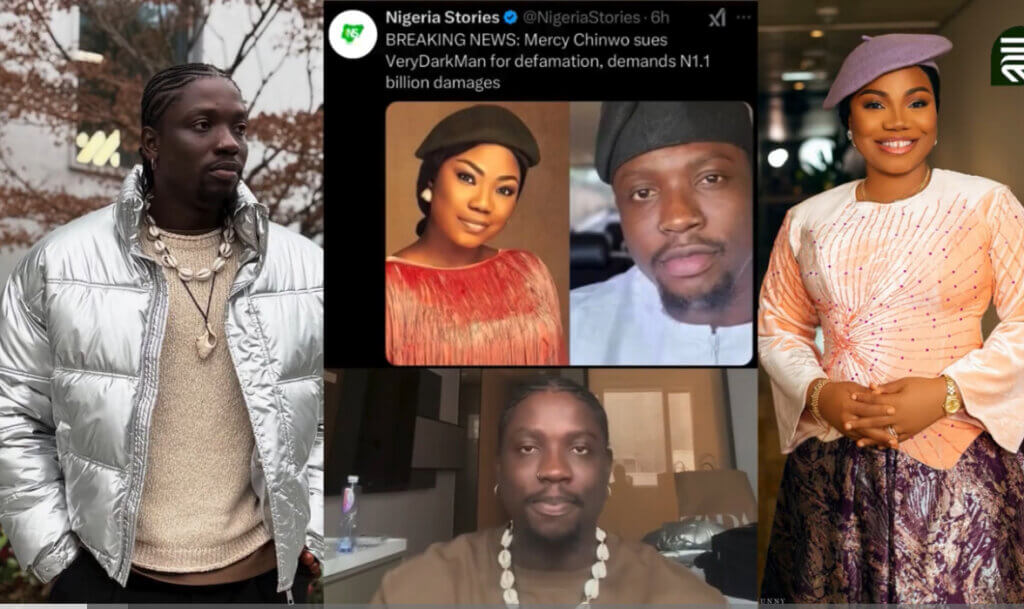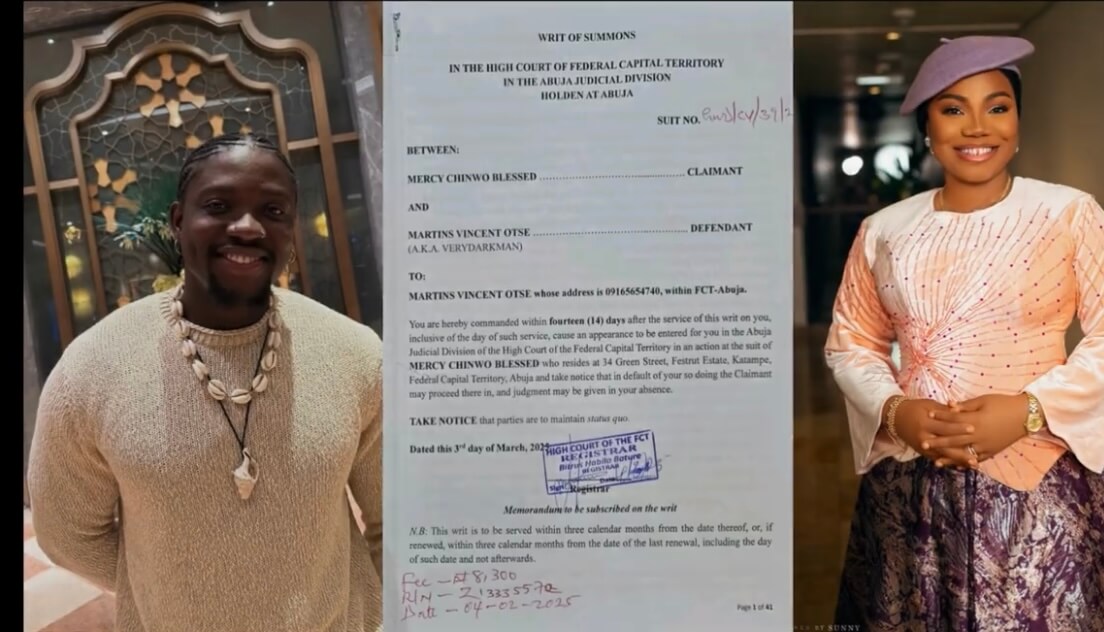In a dramatic turn of events, a prominent blogger known as VeryDarkMan (VDM) has been formally summoned by the Chief Magistrate Court in Wuse Zone 6 over allegations of criminal defamation against popular gospel singer Mercy Chinwo. The summons, issued on March 5, 2025, requires Martins Vincent Otse—better known by his online moniker VDM—to appear in court on March 13, 2025, to face charges that have sent ripples through Nigeria’s digital and entertainment communities.
The case centers on a series of social media posts made by VDM, in which he accused Mercy Chinwo of being involved in a contractual dispute and diverting a sum of $345,000 linked to her former record label boss, Ezekiel Onyedikachukwu, popularly known as Eezee Tee. According to the court documents, these statements have been deemed defamatory, as they allegedly cast a dark shadow over the reputation of one of Nigeria’s most renowned gospel voices. Mercy Chinwo, supported by her legal team from the Abuja-based Law Corridor and led by Pelumi Olajengbesi, has provided extensive documentary evidence, including emails and payment receipts, to demonstrate that the claims were completely unfounded and intentionally harmful.
ALSO READ: Interesting stories
The criminal complaint cites specific provisions of Nigerian law—namely, Section 391 of the Penal Code and Section 24(1)(B) of Cybercrime (Prohibition, Prevention, etc.) Act 2015—to underscore the gravity of the allegations. The legal team argues that VDM’s actions were not merely reckless but were carried out with the clear intent to tarnish Chinwo’s public image and reputation. Mercy Chinwo’s counsel insists that the blogger’s posts were made without any provocation and were designed solely to lower her standing in the eyes of the public, potentially causing irreparable damage to her career and emotional well‐being.
In addition to the criminal summons, Chinwo’s lawyers have also taken the matter to the High Court of the Federal Capital Territory, seeking damages in the amount of N1.1 billion. They are demanding that VDM not only be held accountable for his defamatory statements but also be forced to delete, retract, and publicly apologize for the posts. This dual legal action highlights the extent to which Chinwo and her legal team are prepared to go to protect her reputation from what they describe as a calculated attack.
This legal drama comes at a time when public figures in Nigeria are increasingly held accountable for their online conduct. The case has stirred considerable debate on the responsibilities of bloggers and social media influencers in an era where information spreads rapidly and the line between opinion and defamation can sometimes blur. Critics of VDM argue that his posts, made on his Instagram account on multiple dates in February 2025—including the 2nd, 3rd, 4th, 5th, 12th, and 17th—were designed to attract attention through sensationalism, regardless of the factual basis behind them.

The controversy is compounded by the fact that this isn’t the first time Mercy Chinwo’s name has been involved in a legal dispute. Her ongoing defamation suit against VDM follows earlier legal actions where her counsel had pressed for accountability and damages. This pattern of legal recourse underscores the challenges faced by high-profile artists in defending their reputations in a media landscape that is both vibrant and volatile.
LEARN MORE: Read blogs and articles here!!!
Notably, the case has attracted attention not just from legal circles but also from the wider public and media commentators who see it as a litmus test for the balance between free expression and the protection of one’s reputation in the digital age. While some observers maintain that bloggers should have the freedom to express their opinions—even if those opinions are controversial—others argue that this freedom should not extend to spreading misinformation that can have a profound and lasting impact on a person’s career and personal life.
Amid the legal proceedings, the defense for VDM remains relatively quiet. There have been no detailed statements from the blogger or his representatives regarding the charges, leaving many to speculate about the potential implications for his online presence and future influence. The outcome of this case could set a significant precedent in Nigeria, influencing how defamation cases are handled in the age of social media. It also raises important questions about accountability and the measures that should be taken when digital platforms are used as a tool for personal vendettas or for undermining the reputations of public figures.
Recommended Broker for Forex Traders!!!
Moreover, this case highlights a broader trend in which traditional defamation laws are being tested by modern forms of digital communication. The rapid spread of information online means that a single post can reach thousands, if not millions, in a very short period of time. Consequently, the impact of defamatory content is magnified, and so too is the response from those who feel wronged by such content. Mercy Chinwo’s legal team is leveraging this reality to push for swift and decisive legal action against VDM, emphasizing that the harm caused by his posts goes beyond mere words and affects her ability to perform her career.
The court’s decision to summon VDM is seen by many as a strong signal from the judiciary that defamation in the digital realm is a serious offense. As the court date approaches on March 13, 2025, legal experts are closely watching how the case unfolds. The outcome could have far-reaching effects, potentially influencing future defamation cases involving social media content and setting new standards for what constitutes “criminal defamation” in Nigeria.
ALSO CHECK: Affordable products
In parallel with this legal battle, the saga also touches on the delicate dynamics of relationships between political figures and the media. Mercy Chinwo, who has long been a symbol of inspirational gospel music in Nigeria, now finds herself embroiled in a dispute that pits her carefully crafted public persona against the unrestrained world of online commentary. The case has ignited conversations about the power of digital narratives and the responsibility that comes with wielding that power. For many Ukrainians of Nigeria’s creative and religious communities, the issue is not just legal but also deeply personal, as it challenges the norms of free expression versus the right to a good name.
While the legal process unfolds, public sentiment appears divided. Some staunch supporters of Chinwo argue that the defamation case is a necessary step to protect public figures from baseless attacks that could have long-term consequences. On the other hand, there are voices that caution against using the legal system to silence dissent, suggesting that such actions could stifle free speech and the robust exchange of ideas online. The debate underscores the complexities of navigating truth, opinion, and defamation in a digital age where every word can have amplified repercussions.
The coming weeks will be critical, not only for the parties directly involved but also for the broader media landscape in Nigeria. The judgment rendered by the Chief Magistrate Court will likely influence how future defamation cases are approached, particularly those involving statements made on social media platforms. It will also serve as a barometer for the effectiveness of current legal frameworks in protecting individuals against the spread of harmful misinformation, while still upholding the principles of free expression.
Open a verified Fiverr account now!!!
As the case progresses, legal analysts predict that the court will consider both the intent behind VDM’s statements and the actual damage inflicted on Mercy Chinwo’s reputation. The evidence provided by Chinwo—emails, receipts, and other documents—will be scrutinized to determine the veracity of the claims made by the blogger. The outcome may very well hinge on whether the court views these statements as reckless and malicious attacks or as opinions that, while controversial, fall within the bounds of free speech.
For now, all eyes remain on the courtroom as the date of March 13, 2025, approaches. The decision reached in this high-profile defamation suit is set to resonate far beyond the immediate case, potentially redefining the legal boundaries of digital expression in Nigeria. As the nation waits with bated breath, the case stands as a stark reminder of the power of words and the lasting impact they can have on lives and careers in the modern era.
Start Trading Your Crypto with Bybit Now!!!

